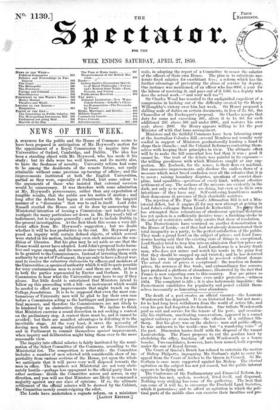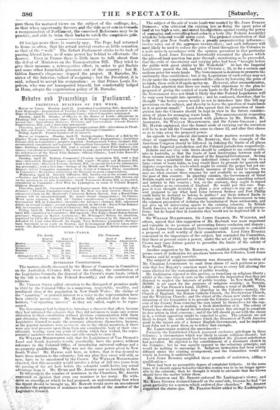The death of a poet creates an official vacancy—the Laureate
Wordsworth has departed. It is an historical fact, but not more ; for he had long been withdrawn from the world of active life, and even his pen had forgotten its function. One tribute Wordsworth paid as suit and service for the tenure of his post; and occasion- ally. his stubborn, unrelenting conservatism, appeared in a sonnet against railways or steam-boats—the effusion of a sublimer Sib- thorp. But his glory was on the shelves : man and public officer, he was unknown to the world—was but "a wandering voice" of the past. Discussion busies itself with the disposal of the vacant Laureateship. The Times proposes to cut the gordian knot by abolishing the office, finishing off with Wordsworth as a bonne bouche. Two candidates, however, have been named, both reposing under the sun of Royal favour. The Court of Queen's Bench has refused to entertain the motion of Bishop Philpotts, impugning Mr. Gorham's right to carry his appeal from the Court of Arches to the Queen in Council. So Mr. Gorham is once more supported against his Bishop. The rr
eleeal agitation on the subject has not yet ceased, but the public interest appears to be dying out.
The Conference of the Parliamentary and Financial Reform As- sociations has met, spoken, resolved, feted itself, and dispersed. Nothing very, striking has come of the gathering. The best that can come of it will be, to encourage the Freehold Land Societies, which it patronizes ; and to afford an agitation in which the poli- tical parts of the middle class can exercise their faculties and pre-
pare them for matured views on the subject of the suffrage, &c., so that when opportunity favours and the tidir next setsin towards a reorganization of Parliament, the exercised Beformers may bmin practice, and able to trim their Barks-to catet the auspicious gale.



























 Previous page
Previous page